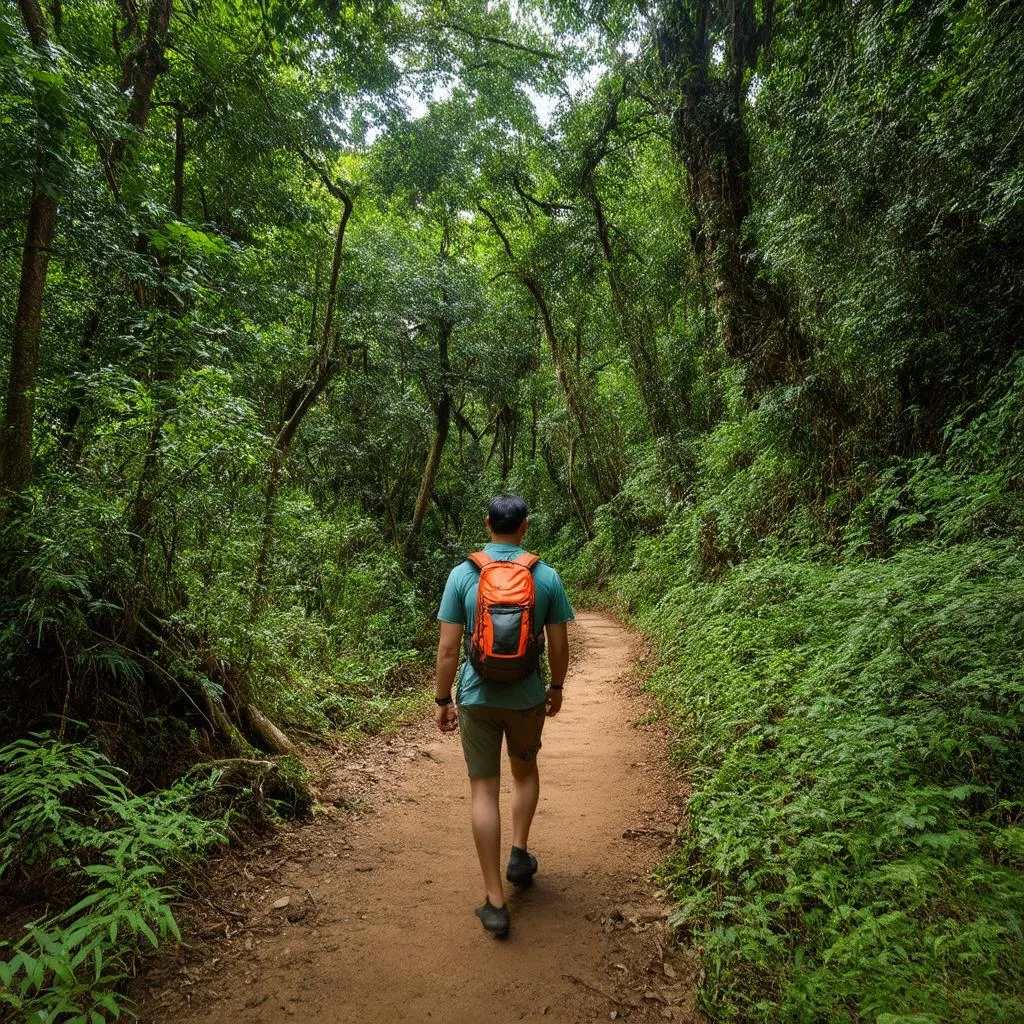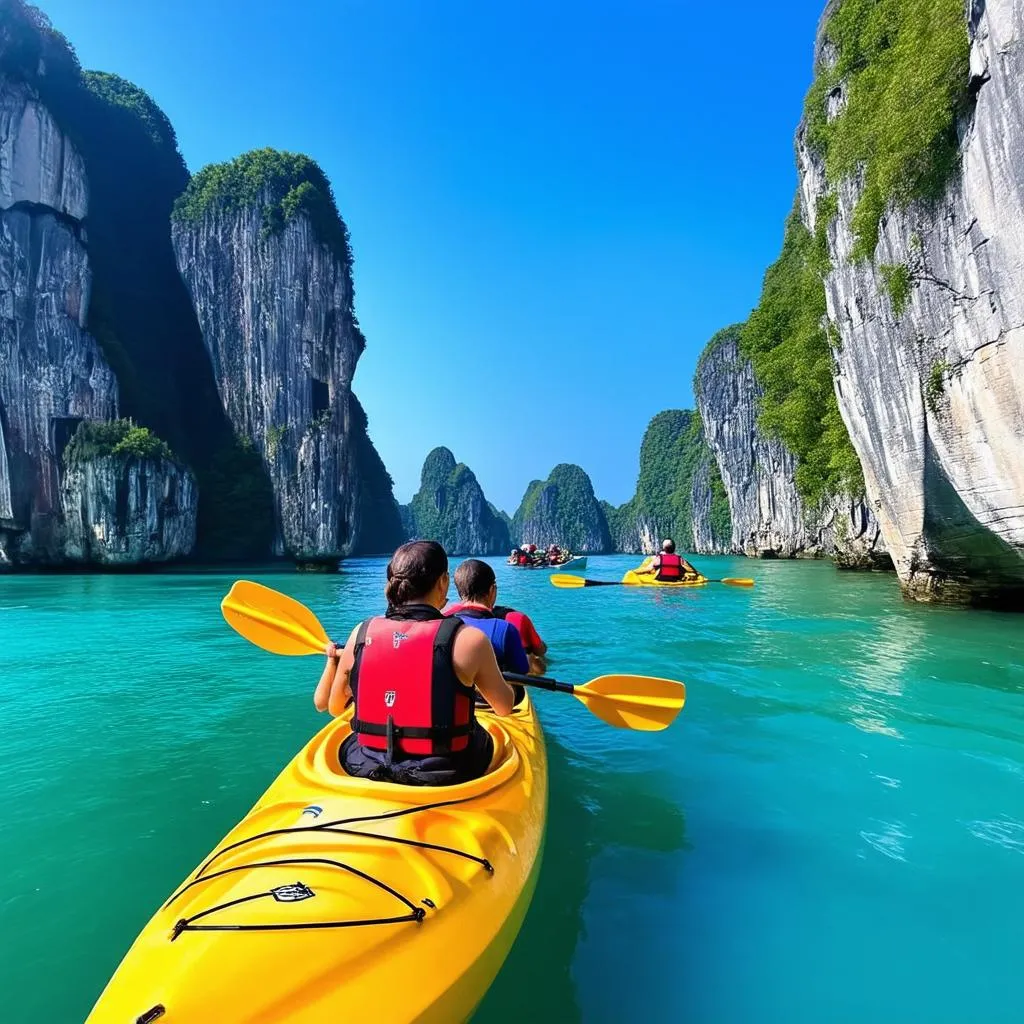“Journey not to escape life, but for life not to escape you.” – Anonymous. This rings especially true when we speak of ecotourism, a mindful way to travel and experience the raw beauty of our planet while preserving its integrity for future generations. Vietnam, with its diverse landscapes from the rice paddies of the Mekong Delta to the majestic mountains of Sapa, is a perfect destination for eco-conscious travelers.
Unveiling Ecotourism: What Does It Mean?
Imagine trekking through lush jungles, encountering unique wildlife, and engaging with local communities who live in harmony with nature. That’s the essence of ecotourism – responsible travel to natural areas that conserves the environment, sustains the well-being of local people, and involves interpretation and education.
Why Choose Ecotourism in Vietnam?
Vietnam, a land of breathtaking beauty, offers a plethora of reasons to embark on an eco-adventure:
- Rich Biodiversity: From the Cat Ba Langur, an endangered primate found only in Cat Ba Island, to the elusive Saola of the Truong Son Mountains, Vietnam boasts an incredible array of flora and fauna.
- Stunning Landscapes: Picture yourself kayaking amidst the limestone karsts of Ha Long Bay, hiking through the rice terraces of Hoang Su Phi, or exploring the vast cave systems of Phong Nha-Ke Bang National Park.
- Vibrant Local Cultures: Interact with ethnic minority groups, each with their unique customs and traditions, and gain a deeper understanding of their sustainable living practices.
Planning Your Ecotourism Adventure in Vietnam
1. Choose Your Destination: Vietnam offers a diverse range of ecotourism destinations. Do you yearn for the cool mountain air of Sapa, the coastal charm of Hoi An, or the Mekong Delta’s intricate network of waterways?
2. Research Ethical Tour Operators: Opt for tour companies committed to sustainable practices. Look for certifications like Travelife or certifications specific to Vietnam, ensuring your trip benefits local communities and minimizes environmental impact.
3. Pack Light and Right: Pack eco-friendly essentials – reusable water bottles, biodegradable toiletries, and a reusable bag to minimize waste. Consider packing light to reduce your carbon footprint during transportation.
4. Respect Local Customs: Embrace the local culture by dressing modestly when visiting religious sites and learning a few basic Vietnamese phrases. Always ask before taking photos of people and respect their privacy.
5. Support Local Businesses: Choose homestays, dine at locally owned restaurants, and purchase handicrafts directly from artisans. This directly contributes to the local economy and empowers communities.
 Ecotourist trekking in Cat Ba Island
Ecotourist trekking in Cat Ba Island
Essential Tips for Sustainable Travel in Vietnam
- Minimize Plastic Usage: Refuse single-use plastics like straws and bags. Carry a reusable water bottle and refill it at designated stations.
- Conserve Water and Energy: Be mindful of water and electricity consumption. Turn off lights and air conditioning when leaving your accommodation.
- Choose Eco-Friendly Transportation: Opt for walking, cycling, or public transportation whenever possible to reduce your carbon footprint.
- Support Responsible Wildlife Tourism: Avoid attractions that exploit animals or contribute to their endangerment. Choose ethical sanctuaries and tour operators committed to animal welfare.
FAQs About Ecotourism in Vietnam
1. What is the best time to visit Vietnam for ecotourism?
Vietnam offers year-round opportunities for ecotourism. However, the best time to visit is during the shoulder seasons (spring and autumn) when the weather is pleasant and less crowded.
2. Are there any specific visa requirements for ecotourism in Vietnam?
Most nationalities require a visa to enter Vietnam. Check the latest visa regulations based on your nationality to ensure a smooth trip.
3. Is it safe to drink tap water in Vietnam?
It’s generally not recommended to drink tap water in Vietnam. Opt for bottled water or use a water purifier to ensure your safety.
 Tourists kayaking in Ha Long Bay
Tourists kayaking in Ha Long Bay
Experience Ecotourism with Travelcar.edu.vn
At travelcar.edu.vn, we’re passionate about showcasing the best of Vietnam’s natural beauty while promoting responsible travel practices. Explore our website for curated ecotourism itineraries, expert tips, and inspiring stories to plan your unforgettable Vietnamese adventure. Discover the hidden gems of Vietnam, from the vibrant streets of Ho Chi Minh City to the tranquil rice paddies of the Mekong Delta. Let travelcar.edu.vn be your guide to exploring Vietnam sustainably.
Embracing the Spirit of Ecotourism
As you plan your ecotourism journey to Vietnam, remember that every step you take, every choice you make, can contribute to a better future for our planet and its people. “Leave only footprints, take only memories,” a popular saying among eco-conscious travelers, encapsulates the essence of ecotourism. Let your journey be a source of inspiration, not only for yourself but for generations to come.